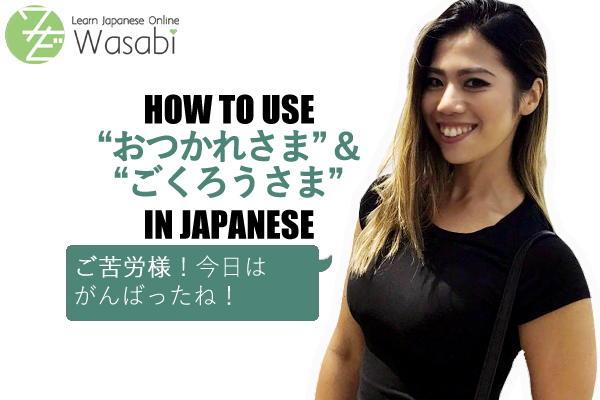How to use “おつかれさま” and “ごくろうさま” in Japanese
Welcome to our second video and article series with tutor Hidee. In this live-stream, Hidee explains how to use the business expressions “おつかれさま” and “ごくろうさま” correctly in Japanese. Many learners are confused about these expressions, since they technically mean the same thing. But since they are different in terms of politeness, it’s important to be able to distinguish between them.
| Table of Contents [“おつかれさまです”ーA key phrase at work] [When to use “お疲れ様です”] [How to use “ご苦労様(ごくろさま)”] |
In this intermediate lesson we will introduce business Japanese phrases you can use at your workplace: “お疲れ様(おつかれさま)” and “ご苦労様(ごくろうさま)”.
[“おつかれさまです”ーA key phrase at work]
お疲れ様です is a key phrase that you will need to master if you plan to work in a Japanese office.
This sentence is crucial if you’re starting new job in Japan and you want to make sure that you develop a warm relationship with your new Japanese colleagues. The key expression that you will have to learn is “お疲れ様でした(おつかれさまでした)”. One translation for this is “Good job”.
In お-疲れ-様, you can find the root 疲れる which translates into ‘be or to get tired’. However, the meaning of the expression is quite different. In the workplace, お疲れ様です expresses the appreciation of your co-workers’ hard work.
The closest English translation would be “thank you for your hard work” or more simply saying “you worked hard”. By saying お疲れ様です, you show your appreciation for a colleague’s work within your team or related to your company.
[adsense]
[When to use “お疲れ様です”]
So when should you use お疲れ様です? First of all, don’t be embarrassed. It might sound strange to repeat it several times a day, every time you see your coworkers. But for your colleagues it shows your desire to get closer and to respect Japanese work culture.
Situation 1 – Arriving at your workplace
In a situation when you would normally say “hi” or “how are you doing” to your colleagues, replace it with “お疲れ様です”. The expression is proper when you arrive at work after your colleagues. It is also a perfect conversation starter or ending, depending on the situation.
Example
A: お疲れ様です、佐藤さん今日は早い出勤ですね!
B: 今日は渋滞がなかったからね。
A: Hi! Ms. Sato, you are in early today!
B: There was no traffic jam today.
Situation 2 – In the workplace
You can use the expression in a wide range of situations. Very often, internal meetings will end with everyone saying “お疲れ様です” as a way to thank all of the participants. Co-workers will thank each other for the completion of a task or when one of them comes back from a meeting outside. “お疲れ様です” expresses the importance of team work in Japan.
Example
A: お疲れ様、さっきの会議どうだった?
B: プロジェクトは予定通り進んでるよ
A: Thanks for your hard work! How was the meeting?
B: The project is making forward as planned.
Situation 3 – After work
The phrase is typically used after working hours, when employees leave the office. The colleagues still working say goodbye with “お疲れ様でした。”.
Example:
A: お疲れ様でした、先に帰ります!
B: 気をつけてね、また明日
A: Good job today! I’ll be leaving first!
B: Take care and see you tomorrow.
What is the difference between “お疲れ様です” and “お疲れ様でした”?
The nuance is a bit tricky. When saying “でした”, you use the past form and imply that the work is “done”, “over”. If you were to leave a colleague to his task you would say “でした”. If both of you are still continuing your work, you would say “お疲れ様です”.
[How to use “ご苦労様(ごくろさま)”]
Have you ever heard your boss say: “ご苦労様”?
The two expressions “お疲つかれ様さま” and “ご苦労様” share the same meaning, showing the appreciation of someone’s hard work. However, the later one is less frequently used as it implies a social connotation and is always directed at a subordinate. Simply speaking, your boss can thank you with “ご苦労様です” but you will answer back with a respectful “お疲れ様です”.
Example
A: ご苦労様、今日もがんばったね
B: お疲れ様です。ありがとうございます!
A: Thank you for your effort! You worked hard today.
B: Thank you!
In a more casual context and with your friends, you can simply use “お疲れ” or “お疲れ様”. Always keep in mind to be careful with the level of politeness in Japanese. When in doubt, use “敬語(けいご)” to be polite.
That’s it for today. If you have any questions, you can always clear them up by booking a lesson with one of our native Japanese tutors. See you next time!
| お疲れ様です | Good job, thank you for your work, thank you |
| ご苦労様 | I appreciate your efforts, thank you for your hard work |
| 疲れる | To get tired |
| 敬語 | Keigo, polite Japanese speech |
| 出勤する | To go to work |
| 渋滞 | Traffic jam |
| 会議 | Meeting |
| 予定通り | As planned |
| 進む | To advance, move forward |
| がんばる | To try hard, to give one’s best |




